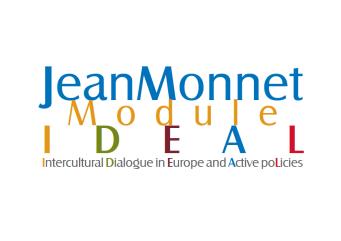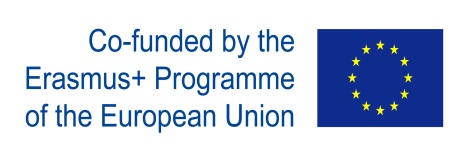- Ateneo
- Jean Monnet Module
- Programme
- a.y. 2018/19
a.y. 2018/19


COURSE AIMS
Recently the tendency against Europe and the link between skepticism towards European institutions and the cultural/religious intolerance call for reinforcing the basis of co-existence in a multicultural society within a constitutional frame. It becomes more and more urgent that University could instill democratic values among young generations, through both the cursus studiorum and the active methods of teaching-learning, as democratic values belong not only to each Nation but to the whole European Citizenship. All European citizens should appreciate the cultural and religious diversity, and should contribute actively in the promotion of dialogue between individuals with different history, culture, language and religion in order to safeguard “interculturalism” as value. Given all this, the IDEAL JM Module aims at arousing fresh reflections among the whole academic and scientific community, by linking European citizenship and the inclusive actions for cultural minorities. The deep comprehension of migration flows, the legal frame for refugees in Europe, and the sustainable methods for improving tolerance and contrasting xenophobia, will stimulate students to become active members of social promotion for Intercultural and Inter-religious dialogue.
COURSE CONTENT
The course includes interdisciplinary lecturers by domestic and guest speakers with different backgrounds in Social Sciences and Humanities (Sociology; History; Pedagogy; Law; Psychology). The following topics will be covered during the course:
1. Opening sessions (basic module 1)
Europe: 21th century’s challenges facing radicalism, intolerance, nationalism
History of European integration.
Basic elements of EU legislation.
Process of identity- and citizenship-building in Europe:
an intercultural dialogue perspective.
Recognizing and preventing neo-racism in Europe.
2. Migration and integration processes in Europe: sociological frame (basic module 2)
The European migration system and its transformations.
Migration policy and integration in Europe.
The European political agenda for intercultural dialogue.
The role of civil society organizations and their interventions for migrants and against racism.
3. Intercultural dialogue and the role of the family (thematic module)
Intergenerational relations among Islamic families
Psychosocial risks for second generations' extremism: the pivotal role of identity
Immigrants’ integration, ethnic identity and intercultural interactions
Different value patterns of families: the system of childrearing values
Religiosity and the transmission of the religious heritage in the culturally diverse Europe
Intercultural education and families
READING LIST
For point 1, Bekemans, L., Globalisation vs Europeanisation. A Human-centric Interaction; Peter Lang: Brussels, Bern, Berlin, 2013. Further information will be provided during the course.
For point 2 the student choices one of the following textbooks:
- Ruspini, P. (2014) The Transformative Character of International Migration and its Impact on Integration Practices and Learning Needs, in F. Bignami, M.G. Onorati (eds) Intercultural Competences for Vocational Education and Training. Experiential Learning and Social Contexts for Enhancing Professional Competences, Milan: Egea, pp. 89-98
- Ruzza C. (2013), Civil Society Actors and EU Fundamental Rights Policy: Opportunities and Challenges, in “Human Rights Review,” Springer Verlag, 15 (1):65-81
- Dines N., Montagna N., Ruggiero V. (2015) Thinking Lampedusa: border construction, the spectacle of bare life and the productivity of migrants, in “Ethnic and Racial Studies”, Vol. 38 (3), pp.430-445.
- Caponio T., Cappiali M.T. (2016), Exploring the Current Migration/ Integration ‘Crisis’. What Bottom-up Solutions?, Vision Europe Summit, pp. 6-16.
For point 3 information about the reading list will be provided during the course
TEACHING METHOD
The course is structured around lectures and open discussions; students are invited to actively participate in debating with the lecturers about ideas, sources and material. The lectures’ material will be posted on the Blackboard platform and the IDEAL website.
ASSESSMENT METHOD
Assessment changes for post-grade students who attend this course on a compulsory or optional basis. For compulsory status, assessment consists of an oral exam on the points 1, 2 and 3 of the syllabus. Students are required to argue about causes and consequences of migration and integration processes in Europe and about strengths and resources of the family in fostering intercultural dialogue. For optional status, students will be requested to prepare a personal statement (max 1000 words) about one of the course topics, according to the module co-ordinator’s guidelines. The assessment is aimed at evaluating the skills in linking opinion and the ability of critical content analysis by means of provided material. Assessment of acquired skills will be based on: correct use of domain-specific terminology; analytical and descriptive skills for the analysis of key concepts.
NOTES
The course is taught in English. Students attending IDEAL must hold an upper-intermediate certification in English language skills (or B2 equivalent). Attendance to the course requires some background knowledge of sociological fundamentals as regards the issues of inequality, migration and integration. Further information can be found on the lecturer's webpage at http://docenti.unicatt.it/web/searchByName.do?language=ENG or on the Faculty notice board.
